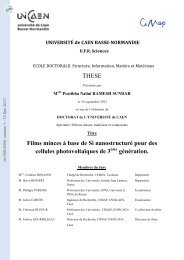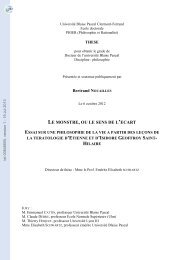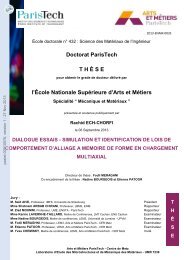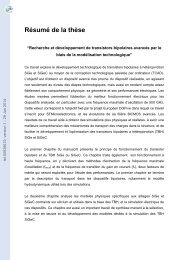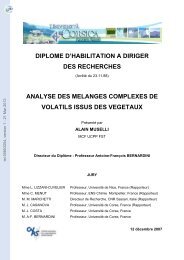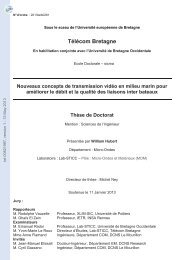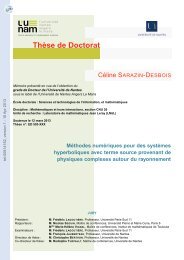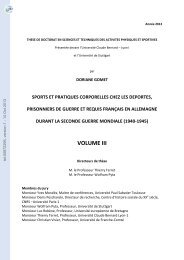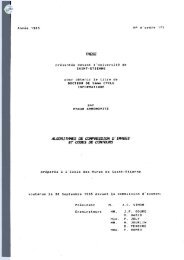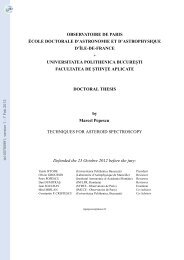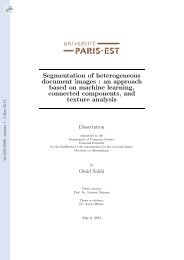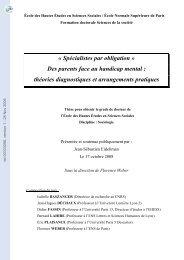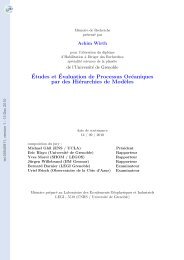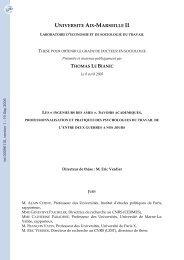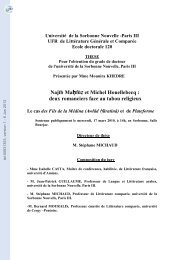Etude de la combustion de gaz de synthèse issus d'un processus de ...
Etude de la combustion de gaz de synthèse issus d'un processus de ...
Etude de la combustion de gaz de synthèse issus d'un processus de ...
Create successful ePaper yourself
Turn your PDF publications into a flip-book with our unique Google optimized e-Paper software.
Experimental study of engine-like turbulent <strong>combustion</strong><br />
more favorable conditions than those existing in real engines (Strozzi et al., 2008),<br />
specially the spontaneous ignition (Brett et al., 2001). RCM can operate un<strong>de</strong>r two<br />
different mo<strong>de</strong>s: single compression and compression – expansion.<br />
The study of the compression process in a RCM operating without <strong>combustion</strong> is useful<br />
to i<strong>de</strong>ntify different parameters re<strong>la</strong>ted with its operation, namely the heat transfer to<br />
the walls. Once <strong>de</strong>termined, these parameters can also be used during the usual firing<br />
cycle. In fact, a common practice in engine testing for <strong>combustion</strong> diagnostic is, prior to<br />
the usual firing tests, to test the engine in motored conditions, with air as the only<br />
working gas (Lapuerta et al., 2003).<br />
5.1.1 Sensibility analysis<br />
tel-00623090, version 1 - 13 Sep 2011<br />
In this section a sensibility analysis is ma<strong>de</strong> with the objective of evaluating the<br />
influence of errors in measurement techniques and in the estimation of various<br />
parameters on the main experimental results. In this analysis the chamber wall<br />
temperature is consi<strong>de</strong>red as constant.<br />
5.1.1.1 TDC position<br />
In or<strong>de</strong>r to <strong>de</strong>termine the precision of the RCM top <strong>de</strong>ad center (TDC) position, a<br />
position sensor was p<strong>la</strong>ced at TDC and various tests performed without <strong>combustion</strong> in<br />
or<strong>de</strong>r to eliminate the effect of the spark time scattering. The analysis of the TDC signal<br />
for the whole single compression experiments without <strong>combustion</strong> performed with<br />
syngas-air and methane-air mixtures enables to <strong>de</strong>fine a typical scattering of the TDC<br />
position on less than 1.67 ms. Consi<strong>de</strong>ring that the compression stroke duration is 44<br />
ms, this gives an overall uncertainty of 3.8% on the TDC position. In or<strong>de</strong>r to <strong>de</strong>termine<br />
the influence of this scattering on pressure signal for the updraft-syngas case both<br />
signals are plotted in figure 5.1.<br />
140



